Doctoral candidate Pauliina Peltonen will defend her PhD dissertation entitled Individual and Interactional Speech Fluency in L2 English from a Problem-solving Perspective: A Mixed-methods Approach this week on September 11th, 2020. The audience will be able to follow the defense online via Zoom. Professor Judit Kormos from Lancaster University will be the opponent and Dr Pekka Lintunen will act as custos.
A doctoral defense is the final part of postgraduate studies: it is the end of one process, but also the beginning of another phase, postdoctoral studies. Defending your PhD is both exciting and nerve-wracking. You finally have the chance to talk about your research and what you have been working on for years. However, the opponent asks the questions, and the task is to react to those questions in the best way possible. Custos is the chair of the public examination of a dissertation and often the supervisor of the doctoral candidate. Normally the custos has to do three things: say one sentence to start the examination, another one to end it, and most importantly, sit quietly but stay awake during the examination—not always an easy task!

Pauliina’s dissertation addresses a central aspect of second language (L2) proficiency and speaking skills: fluency. In the dissertation, she examines L2 speech fluency and learners’ resources for maintaining it based on monologue and dialogue speech samples. Fluency is analyzed with a variety of traditional temporal measures (e.g., speech rate and silent pauses), but also from the perspective of so-called fluency resources that can help to maintain speech fluency (e.g., filled pauses, such as uh/um, and repetitions).
The findings show that L2 speech fluency is a multifaceted phenomenon. Fluency should be studied with a combination of quantitative and qualitative methods: the mixed-methods approach provides a more comprehensive picture of fluency than either approach alone. The study also shows that fluency can be viewed as a collaborative phenomenon, while traditionally, fluency has mostly been examined from an individual’s perspective based on monologue data. The study demonstrated that in interaction, learners maintain the flow of speech collaboratively across turns, for instance, by minimizing pause time.
The study provides new insights into L2 speech fluency—a topic that has become a key area of study in the Department of English in recent years. We also collaborate with other fluency researchers in the School of Languages and Translation Studies. Two fluency research projects have been launched just this autumn in the department: Fluency across Multilingual Speakers (MultiFluency; funded by the Swedish Cultural Foundation in Finland 2020–2021) and Fluency and Disfluency Features in L2 Speech (FDF2, funded by the Academy of Finland 2020–2024), both led by Dr Pekka Lintunen. So when one phase is soon over for Pauliina, the next phase will begin in these research projects. We are looking forward to continuing our collaboration and gaining more insights into L2 speech fluency in the near future!
Zoom link for the defense on Friday: https://utu.zoom.us/j/61267813839
Text by Pauliina Peltonen and Pekka Lintunen
Photo by Pauliina Peltonen
The Custos needs to “sit quietly but stay awake during the examination—not always an easy task!” – I don’t think there is any danger of Pekka falling asleep though 🙂 Sitting quietly is another matter!
I very much look forward to following the viva online and send you my best wishes – may all go well!
Greetings from Uppsala, and thanks for the post, which nicely tunes us in for Pauliina’s Big Day!